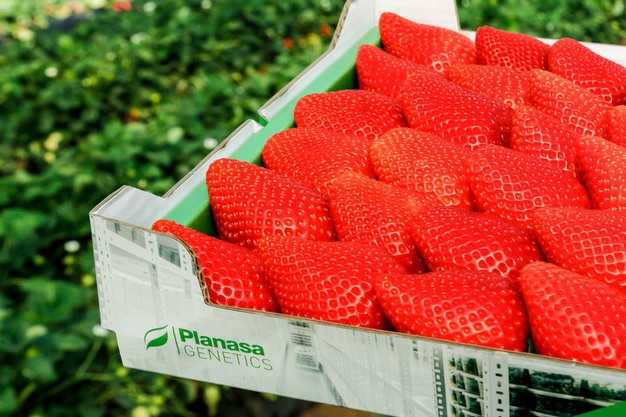Huelva's berry sector continues to evolve, seeking productivity and quality in a changing and increasingly challenging climatic environment that is making it necessary to use water more efficiently, as well as to have production schedules that meet the needs and commercial demands of growers and consumers, respectively. As a leader in the breeding and development of berry varieties, Planasa continues to achieve progress in genetics, allowing it to meet the changes and challenges that arise season after season.
"For the next strawberry season, we hope to exceed 15% of the market share in Spain"
"In the next season, we expect to continue growing and reach a market share of more than 15% in Spain," says Julián Rioja, Commercial Director for Iberia and Africa at Planasa. "Our aim is to grow gradually, hand in hand with the growers, offering them technical support throughout the entire production process so that they can obtain maximum yields and the best possible performance from our varieties."

It is worth recalling that last season was the second commercial campaign for Planasa's two most recent strawberry varieties. We are talking about RedSayra® and Red Samantha®. The former is a variety that stands out for its earliness, hardiness and high linear production during its growing cycle. As for the latter, we can say that it is a seasonal variety that stands out mainly for its very high quality production from late January onwards.
"Regarding the RedSayra®, we are very satisfied to see how, in a short time, it has become one of the leading varieties for the sector in Huelva. In fact, it was one of the most widely planted last season. Also, the main European retailers have bet on this variety and are valuing it very positively," says Rioja.
In recent seasons, the problems with strawberry plants coming from nurseries in northern Spain seem to have worsened. How can Planasa contribute solutions?
"The saying that no two seasons are the same is becoming truer than ever in recent seasons. To the obvious weather anomalies we are experiencing year after year, we must add other difficulties, such as the lack of active matter for soil disinfection.We can easily conclude that these years have not been easy for anyone," says Julián Rioja. "In such circumstances, the only thing left for us professionals in the sector to do is to adapt to continue providing solutions, and we believe that this is being done in quite an appropriate manner. Our duty as breeders is to develop varieties capable of responding to all the difficulties or changing meteorological conditions arising each season."
"Our objective is to improve and develop varieties that require as little water as possible. This factor is even more important if we take into account the water shortage suffered by the sector in the last few seasons. Thanks to the implementation of new technologies in line with sustainable development, in our nursery we have managed to reduce water and fertilizer consumption by almost 30%," he says.
"And we are proud to see that our work in this area is already bearing fruit. Proof of this is that, according to a recent report from IFAPA on the results of strawberry variety trials for each season, the RedSayra® has a remarkably low need for irrigation. To be precise, our variety required 9% less water than average, compared to other 15 varieties from other breeding programs."
What are the main challenges in genetics for Spanish strawberries?
"We are currently working on different lines of research. One of the main ones is aimed at developing varieties with great hardiness and tolerance to the main soil diseases," says Julián Rioja.
"And that, of course, without ignoring very important factors for the grower, but also for the end consumer, such as productivity, ease of harvesting or the fruit's organoleptic properties. It is a priority for our clients to be able to be more competitive and, in short, to be able to fulfil their objectives each year. It is a challenging job and one that never ceases, as various factors are constantly changing but, at Planasa, we are more than satisfied with the materials that are already arriving and those that are still to come, not only for strawberries, but also for the rest of our products, such as blueberries, blackberries and raspberries."
 For more information:
For more information:
Planasa
www.planasa.com
